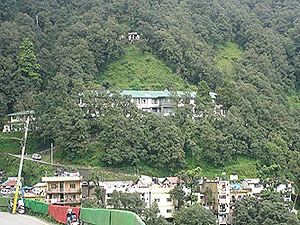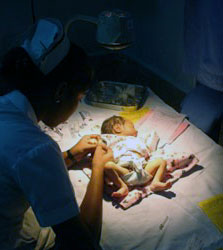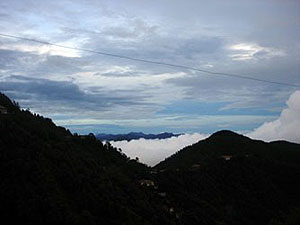
From the 3rd August to the 22nd September I was based in two EHA (Emmanuel Hospital Association) hospitals in the Uttarakhand district in the Himalayan foothills of North India. Before arriving at the hospitals I attended attend orientation sessions with both Interserve (a UK-based organisation) in Pune and EHA (Emmanuel Hospital Association, an India-based organisation) in New-Delhi. These sessions were designed to not only ensure that I knew exactly what my time there was to entail and what was expected of me, but also to give me insight into the cultural differences I was likely to come across and how I could be culturally sensitive.
Interserve partners use their professional skills, such as in medicine, engineering, teaching, etc. to share the love of Christ with the people they live and work with. Their 'On track' scheme allows people to carry out short term mission, of two months to two years, in areas of most need across Asia and the Middle East.
EHA primary focus is the poor, largely in rural areas. With a catchment population of nearly seven million, EHA treats more than 500,000 patients each year in some of India's most needy areas. EHA is committed to the transformation of communities with programmes that invest in the health and well being of everyone, irrespective of caste, creed or race.
The first month will be based in Landour Community Hospital. It is a 35-bed hospital located in the Himalayan foothills and serving the hill people of Mussoorie and nearby villages since 1931. The hill people in the villages are very poor, living at a subsistence level, with high infant and maternal mortality rates compounded by malnutrition.
The second month will be based in Herbertpur Christian Hospital, which is a 100-bed hospital situated in Doon Valley at the foothills of Himalayas. It was founded in 1936 by Dr. Geoffrey Lehman and his wife to serve the hill-tribe people. On 1973 the hospital was handed over to EHA. It is now a training and teaching hospital offering training in Reproductive & Child Health care, Surgical Technology & Family medicine program.
Landour Community Hospital
Main objective of the elective before setting out from Southampton It seems that ever-increasingly there is a rich-poor divide throughout this world, where the well-off go so far leaving everyone else behind. I saw the importance of going out, not only fully immersing myself within the culture, but also partaking in truly beneficial work. Before setting out, I was looking forward to using previously learnt clinical skills in a completely different culture and setting. Through this work I was to carry out, I hoped that I might be able to make a difference (maybe even if only in small way!) to the lives of some of the hill people I was to meet. I also hoped that through my faith in Jesus Christ, I might be able to show His love and hope that He brings, through my actions, to people in a much less well-off community. I knew that what I had ahead of me wasn't going to be easy physically, mentally or emotionally, but I had the assurance that whatever I was to face, I had the guidance I need to fully embrace all the challenges it was to bring!
Main activities during the attachment
I wrote about the experiences I was having whilst out there; not only to let the friends and family know what I was up to but also to be used to reflect upon in the future. (If you'd be interested in reading more, please see www.mytripjournal.com/joanna).
A typical day in the hospitals

Mornings typically started with morning devotion where songs were sung and a short Bible study was spoken. It was quite interesting (especially at HCH) to see the reactions of the patients and their families to this as most of them came from other religious backgrounds. I also liked the way that no one was forced to attend so people would come and go as they pleased. I thought this was a great way of showing the public the ethos of the hospital without being too in their faces (especially wise considering the current problems of persecution of Christians in other parts of India), hence deterring them from getting the health care they so desperately needed. In HCH this would be followed by the doctor's meeting, in which the doctor whom was on call the previous evening would present a case to be discussed- a fantastic opportunity for all to learn from, but often quite daunting for the doctor being grilled! Unfortunately due to the heat, having to stand for while and the cramped nature of the room, it did take a while for me to get used to this and not end the meeting on the floor with a number of doctors flocked round me! Embarrassing!
Outpatient's department followed the ward rounds. They were really informative and again I saw many conditions ranging from the very common (many respiratory infections) to the very very uncommon- for instance the lady who had had such an intensive photosensitivity reaction, her skin was now like leather- I actually couldn't believe my eyes. I was given the opportunity to observe in many different fields but I mainly attended Paediatrics, Family Medicine and Obstetrics and Gynaecology out patient appointments- the areas that most interested me.
Village clinics
Both of the hospitals were a part of the organisation EHA (Emmanuel Hospital Association)- focused on outreach to the hill-tribe people through transformation of communities with programmes that invest in the health and well being of everyone. This meant that as well as taking part in informative ward rounds and outpatients clinic, I also had the opportunity to go on visits to the village clinics. Due to the isolated location of Landour (LCH) in the foothills, the village clinics could only be reached by foot- this an adventure in itself!
Any problems encountered or unsatisfactory aspects of the attachment
Although I had an absolutely amazing experience, I'd be lying if I said I was completely satisfied with all aspects of my attachments. Earlier in the year Landour Community Hospital had massive renovation work worth just over $250,000, after donations from a from a man whom had been previously been treated in the hospital when he was a child. The memories of service he got stayed with him for a long time, so when he became a successful entrepreneur he put some of his earnings to very good work. The hospital was impressively clean, tidy and modern- far from what it was honestly expecting, but unfortunately many of the village people thought that the hospital's services were no longer available to them so patient numbers were very low; far from capacity. Disappointingly this meant that I was unable to fulfil my objective of gaining clinical experience fully.
In contrast to this, unfortunately in HCH I found it most challenging to keep a balance between being available to help out with clinical practice, but also not putting myself in difficult situations. It's all too easy for medical personnel from developing countries to make assumptions about the capabilities of (white) Western elective students. At my orientation sessions I'd heard horror stories of students having been put in clinical situations far more superior to their capabilities and alien to the scenarios they'd previously encountered. I'm sure that this would have been an amazing learning experience, but I was all too wary of this making the patients out to be commodities to aid my learning of new skills. I didn't feel comfortable or supported strongly enough in these situations, so on many occasions opted for a more of an observatory role. Needless to say, I still learnt a lot from the experience I did have.
Opportunities for non-academic activities

As I had originally planned to spend the entirety of my elective at HCH, on reflection, I'm really happy to have spent the first three and a half weeks at LCH. This was not only a great opportunity to experience life and clinical practice in another very different setting, but the laid back nature of the hospital allowed for some afternoon to be spent at my leisure; mainly trekking in the foothills, reading, sleeping(!) and shopping(!). I was certainly happy to welcome this after the hectic experiences of the previous weeks (Intermediates!!!). I was also able to meet up with some of the other Interserve partners working at the local boarding school- it was lovely to spend time with them and reflect on what I had seen and the experience I had had with fellow, like-minded Westerners. At HCH I was given the opportunity to attend Bible studies (often in Hindi!...but I loved the opportunity to experience worship in a completely different culture!) and time of praise with other employees at the hospital. A great opportunity to reflect on the work we were doing, place any difficulties we were facing into to God's hands, but also praise Him for His faithfulness in the difficult times.
I also was given flexibility in taking weekends off to explore other parts of the North of India. I travelled to the Punjab to see Amritzar (home of the Sikh pilgrimage site the Golden temple) and the Pakistani border ceremony, to see the evening Puja ceremony at Haridwar (a Hindu pilgrimage site on the banks of the river Ganges), Rishikesh (the place where the Beatles wrote the White album…hippies as far as the eye could see!) and before heading home I spent a day in Agra and saw the breath-taking Taj Mahal (…it would be a crime to travel all the way to India and not!).
Observations relating to cultural diversity and lessons learnt Observing and partaking in Indian clinical practice was an amazing eye-opener and in many ways lead to a greater appreciation of ease and the availability of the health service of the United Kingdom.
I was very surprised at the number of patients who presented to the doctor a long time after the first symptoms appeared, sometimes up to six months or even a year.
Many people would have to travel for miles, maybe even over the time course of a couple of days to see the doctor. I found it quite surprising when walking around the grounds of the HCH at nightseeing the many family members whom had taken that journey with them; some for moral support and others because their main care givers were now at the hospital either as the patient or as one of the supporting members. They would sleep under the stars outside the wards and gather to cook around small fires. These people were also in charge of making sure that their sick family member was fed; this is why when my friend on elective from Peninsula fell ill in LCH I was in charge of making sure he was fed and watered!
As the hospitals didn't stock drugs or medical equipment family members were also in charge of going to the local 'druggist (!)' (pharmacist) to pick up the necessary supplies. Nothing was free but everything was heavily subsidised. Everyone paid the same. With many people packing out the wards (in addition to the patients) during ward round, I found it quite amusing when a doctor would ask a question to the patient and a member of a different family would answer from them! "Oh actually…she was coughing quite a lot last night…" Privacy left much to be desired! There were no curtains on the wards, so even during intimate examinations or very private conversations it seemed the whole ward was involved.
In conclusion, I'd like to say how thankful I am for having been given the opportunity to have the experiences I had. I thoroughly enjoyed my time and I have many hgappy memories to take away from it. I can also safely say there were some situations that I would rather forget, but these will serve as a great reminder of how there is still so much inequality in this world and how incredibly fortunate we are in the developed world. I hope that through my short time in India, I might have made a difference to some of the lives of the people I met, even if in a very small way. As a result of my experiences, I'm strongly considering going out to India to work once fully qualified - let's just see what doors open for me in the future!































